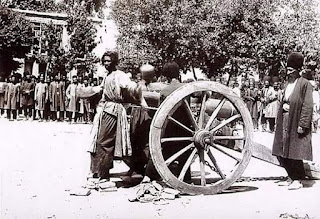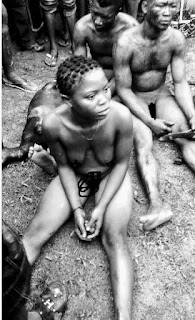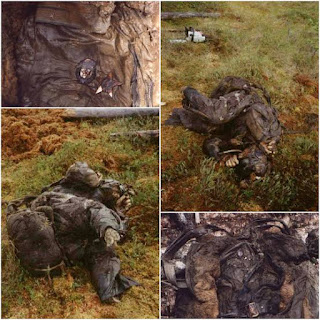Human Rights Court: Denial of Armenian genocide is not a crime–world history and facts
.jpeg) |
| Mass grave. Armenian genocide, undated. [Public domain] |
Human Rights Court: Denial of Armenian genocide is not a crime.
The European Court of Human Rights ruled on Thursday (15 October) that a Turkish politician should not have been prosecuted for denying that the mass killing of Armenians by Ottoman Turkey in 1915 was a genocide.
Switzerland had violated the Turkish politician’s right to freedom of speech by convicting him for denying that the killing of Armenians by Ottoman Turks in 1915 amounted to genocide, the Court ruled.
In a landmark free speech ruling, the ECHR judges ruled by 10 votes to seven that Dogu Perincek, chairman of Turkey’s Patriotic Party, should never have been convicted of racial discrimination by a Swiss court for saying that the “Armenian genocide is a great international lie”.
Perincek was convicted and fined in 2007 after a series of press conferences on the topic, which the ECHR ruled was an infringement on his right to free speech.
In its judgement, the court said Perincek’s statements related to an issue of “public interest and did not amount to a call for hatred or intolerance … and could not be regarded as affecting the dignity of the members of the Armenian community to the point of requiring a criminal law response”.
The court made a clear distinction with Holocaust denial, whose specific history meant it could always be “seen as a form of incitement to racial hatred” in certain countries.
Its judges have earlier noted that the historical facts of the Holocaust, “such as the existence of gas chambers” were “considered clearly established by an international jurisdiction”.
Sensitive debate
The events of 1915 are a highly sensitive issue both in Turkey and among Armenians in Armenia and in the diaspora. Muslim Turkey accepts that Christian Armenians were killed by Ottoman forces during World War One, but denies there was any systematic attack on civilians amounting to genocide.
Perincek tweeted his reaction, presenting the case as part of a national struggle reaching back into the early years of the 20th century when the modern Turkish state emerged.
“This is not a historical debate or legal dispute. This is a defence of the country. A fight for independence!” he said.
The Strasbourg-based court said in a statement it had ruled that it was not necessary to criminally convict Perincek to protect the rights of the Armenian community.
“The Swiss courts appeared to have censured Mr Perincek simply for voicing an opinion that diverged from the established ones in Switzerland, and the interference with his right to freedom of expression had taken the serious form of a criminal conviction,” the court said.
Perincek had been ordered to pay a number of fines, suspended for two years, and 1,000 Swiss francs in compensation to the Switzerland-Armenia Association for non-pecuniary damage.
Decision left to international criminal courts
The ECHR said it did not have the authority to rule on whether the Armenian killings were a genocide or not, which was a job for international criminal courts.
It also accepted that “the dignity of the victims and the dignity and identity of modern-day Armenians were protected by Article 8” of the European Convention on Human Rights.
But it ruled that in the specific circumstances of the case, a democratic society should not have gone as far as prosecuting Perincek over his comments.
“The context in which they were made had not been marked by heightened tensions or special historical overtones in Switzerland,” the ruling said.
“The Swiss courts appeared to have censured Mr Perincek simply for voicing an opinion that diverged from the established ones in Switzerland,” it added.
The ECHR’s Grand Chamber ruling is final and binding on all Council of Europe members.
Perincek’s lawyer Laurent Pech has earlier said that his client “neither contested nor defended the massacres,” but merely denied that the Ottoman authorities of the time had a genocidal intention.
Armenia: Judgement is ‘very good result’
Even though the ECHR ruling went in Perincek’s favour, it was welcomed by Armenia’s government, which said that although the Turkish politician was exonerated, the court had recognised Armenians right to protection against hate speech.
“It means that states in Europe can punish Armenian genocide denial if it is calculated to incite violence or racial disharmony,” Armenia’s prosecutor general Gevorg Kostanyan said in a statement.
“The judgement is a very good result for Armenia and for Armenians,” he added.
That interpretation was backed by Geoffrey Robertson, the high-profile British lawyer representing Armenia, who said the ruling clearly stated Armenians had “a right to respect for their history”.
The Swiss authorities were indeed wrong to prosecute Perincek, Robertson added, but only because he was “a worthless provocateur”.

.jpg)

.jpeg)






Comments
Post a Comment